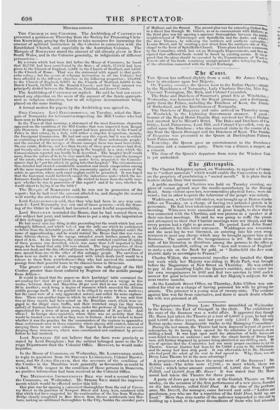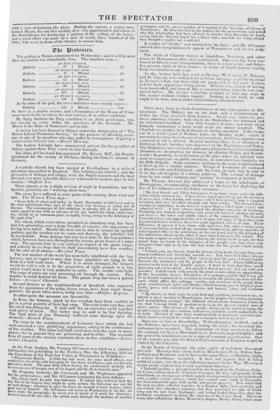The proprietors of Drury Lane Theatre assembled on Wednesday, in
the Saloon ; the Earl of Glengall in the chair. The exhibition of the state of the finances was a woful affair. It appeared that though Mr. Bunn had taken the Theatre at a rent of 6,000/. a year, he had only paid 6,0001. in three years, and last year only 1,3501. ! Mr. George Robins spoke some disagreeable truths to the Managing Committee— During the last season, the Theatre had been disgraced beyond all power of redemption, by its having been opened. for the admission of persons at one • shilling a head. It was kept open until the attraction of both horses and asses failed to draw an audience ; and then the classic boards of Drury Lane were still further disgraced. by persons being admitted at one shilling each. He was of opinion that the Committee had not made proper exertions to let the Theatre. Covent Garden had been let for 7,0001. a year to Mr. Osbaldistoa and the mosey had been duly paid. It was afterwards let to ale. alacreada who had paid the whole of the rent he had agreed to. Why, then, was not Drury Lane Theatre let to the same advantage ?
A proprietor wished to know the actual state of the finances ?
Robins said—The debts were 17,706/.; to meet which, there was 17,704/. ; which latter amount consisted. of, 5,000/. due from Captain Polhill, and 12,0001. from Mr. Bunn ! It was stated that Mr. Hann mond had taken the Theatre for three years. A party of Jews got up a little riot at the Garrick Theatre on Wed- nesday, on the occasion of the first performance of a new piece, founded on the late robbery, called Gold Dust. At the close of the perform. ante, Mr. Denvil, the manager, came forward and said—" Ladies and gentlemen, you who are for a repetition of the Gold Dust, hold up one
hand." More than nine-tenths of the audience responded to the call by holding up a hand, to the great discomfiture of those who had attended with a view of damning the piece. During the uproar, a young man, named Myers, the son of a wealthy Jew, was apprehended and taken to the Stationhouse for destroying a portion of the ceiling of the house ; and a great eillot was made by a mob of nearly three hundred of his tribe, who were in front of the theatre, to rescue him.



























 Previous page
Previous page